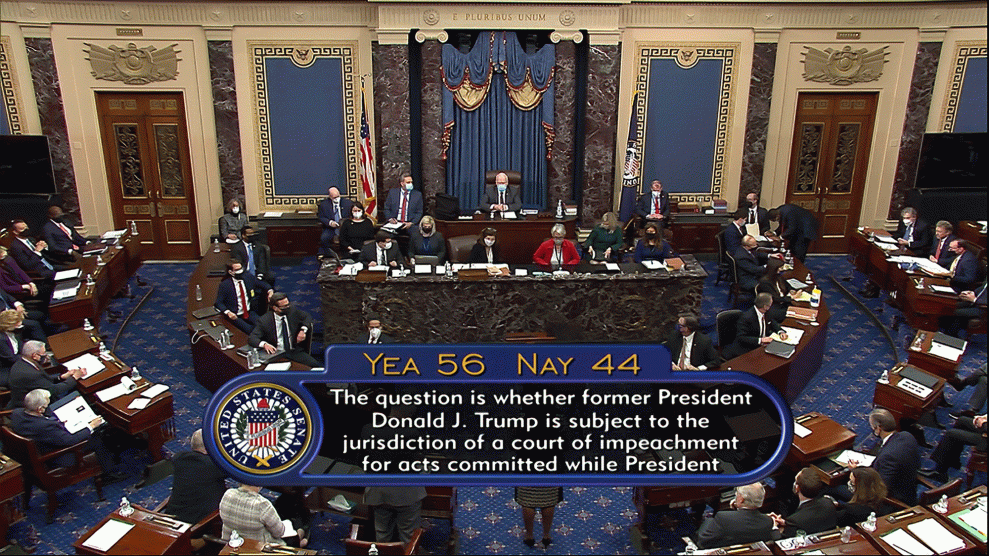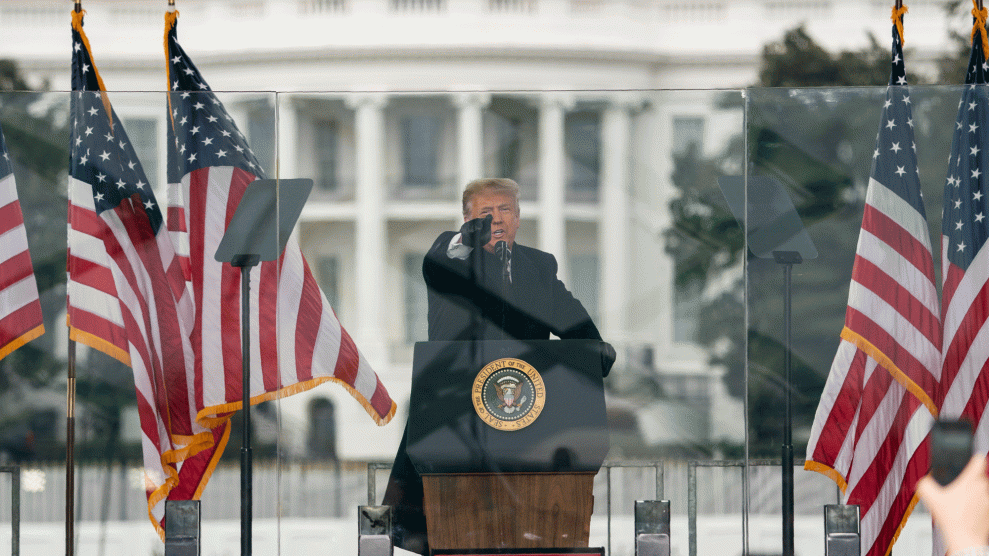
/AP
Bruce Castor ambled and rambled through an opening argument that at times was close to incomprehensible. Only the writers for Saturday Night Live could have found it useful. David Schoen angrily yelled about partisanship to make a highly partisan argument against impeachment. Then he read a 1849 allegorical Longfellow poem about a brave nation surviving stormy seas—though that work’s calls for the country to “prevail o’er angry wave and gust” could well justify the proceedings at hand. Donald Trump’s lawyers offered a weak and ineffective case on the opening day of his second impeachment trial, as the two sides jousted over the constitutionality of holding an impeachment trial for a president who was no longer in office. The feebleness of the bumbling Trump team’s argument was starkly evident coming after the masterful presentation by the House impeachment managers led by Rep. Jamie Raskin (D-Md.), who clearly demonstrated they had both the framers and current constitutional scholars—conservative and liberal—on their side.
But it didn’t matter. At the end of the day, 44 out of 50 Republican senators, including Mitch McConnell (R-Ky.), voted for the without-foundation proposition that the trial was unconstitutional. This wouldn’t stop the trial. But it was a clear signal that the House managers are unlikely to win the 17 GOP votes necessary for conviction. And it was a signal that the Republicans don’t give a damn about reality. Trump’s lawyers failed to make a cogent or accurate argument. Yet most Republicans embraced their position, as they looked for a way to escape the tough question of whether to convict Trump for inflaming and inciting his followers who attacked the US Capitol to overturn the election. Now that these Republican senators have cynically declared the trial unconstitutional, how can they in good faith vote for a conviction?
Heading into the trial, the case against Trump was already proven. Public events and news reports had revealed and disclosed his villainy. For weeks prior to the election, Trump had plotted how he could undermine the results and hold on to power should he lose. He then falsely declared victory and spent months promoting lies and conspiracy theories about the election tallies, claiming he had won in a landslide. He pressured election officials in Georgia to rig results for him after the fact. (That might well have been illegal, and law enforcement officials in Georgia reportedly have opened an investigation.) He and his lieutenants riled up millions, and Trump called them to Washington for a “wild” day on January 6. He then leaned on Vice President Mike Pence to take unconstitutional action to block certification of the electoral votes, and, when that failed, he directed a crowd that included neo-Nazis, Christian insurrectionists, QAnon devotees, white supremacists, and other extremists—Trump’s brownshirts—toward the Capitol to “fight like hell.” And while they rampaged—killing a police officer, maiming others, and threatening lawmakers—Trump reportedly watched with excitement and took no immediate steps to defend the Capitol from the murderous marauders, abandoning his duty as commander-in-chief. When he finally asked the crowd to disperse—after nearly two hours of mayhem—he told it, “we love you.”
None of that is in dispute. The public does not need a conviction at this trial to confirm this account. The graphic and gripping video played by the House impeachment managers on the first day says it all. And Trump has already been booted out of office. (At the end of his opening broadside, Castor, intentionally or not, gut-punched Trump, who continues to assert that the election was stolen from him, by proclaiming, “He was removed by the voters.”) A conviction, though, would provide the Senate the opportunity to pass by a majority vote a measure prohibiting Trump from running for office again.
Several Republicans do appear poised to vote against Trump at the end of the trial. That would mean that Trump’s guilt—his role in an attempted insurrection—would be affirmed by a bipartisan majority of the Senate. And that is how this horrible episode will be recorded in future history books. So with or without 17 GOP votes, the story of Trump’s treachery and betrayal will remain the same.
What the Republican senators are truly deciding now is their own fate—their own part in this crime against American democracy.
A month ago, The New York Times ran a banner headline on its front page: “G.O.P. Leaders Begin To Break With Trump.” Uh, no. Yes, for a nanosecond, McConnell’s team floated the notion he might vote to convict Trump. And House Republican leader Kevin McCarthy declared that Trump bore responsibility for the assault on the Capitol (while joining almost all of his caucus in voting against impeachment). But that post-Trump GOP moment was fleeting. House Republicans rallied behind the ultra-Trumpy Rep. Marjorie Taylor Greene, who had endorsed calls for assassinating House Speaker Nancy Pelosi, Barack Obama, and Hillary Clinton. And 45 Senate Republicans, including McConnell, voted late last month for a measure championed by Sen. Rand Paul dubbing the impeachment trial unconstitutional. (After the first day of the trial, McConnell’s squad re-floated the idea he might come around to voting against Trump.)
Trump was—and is—still the king of the party. The cult of personality was holding strong. As a party, the Republicans were not moving on. And they would not hold Trump accountable for his crusade to subvert an American election—an effort that led to death and destruction on Capitol Hill.
With this trial, the Republicans are in the dock. Trump’s infamy is already guaranteed. In the years ahead, Americans will watch the 13-minute-long video compiled by the impeachment managers—as we now watch the videos of the brutality on the Edmund Pettus Bridge or the footage of the Kent State shootings—and render the obvious and appropriate judgment. There will be no changing that. But the Republicans had a chance to separate themselves from this American horror story. To show they are a party, not a cult. To demonstrate they are loyal to the Constitution, not to a narcissist who conned millions into believing his dangerous lies. And they said, no thanks, we’ll stick with what we got. This is no shocker. It’s been their M.O. since they joined in with the “lock her up” chants at the GOP convention in 2016 and cheered Trump’s “American carnage” speech at his inauguration. They have continuously excused or embraced Trump’s brutal demagoguery and his never-ending deceit. And they are now doing the same even when Trumpism has turned violent and threatened the national security of the United States. With their vote on the opening day of the trial—and with their presumed votes ahead to acquit—these GOP senators are chaining themselves to Trump for all time, and that is certainly a fitting punishment for them.







